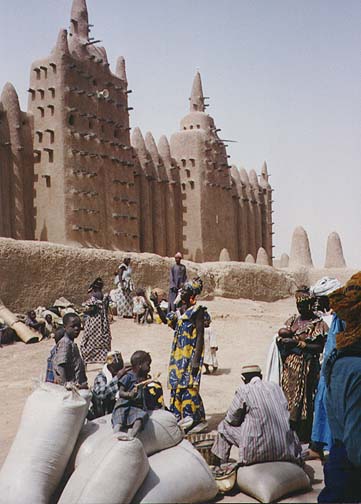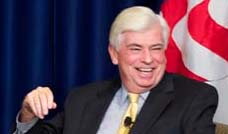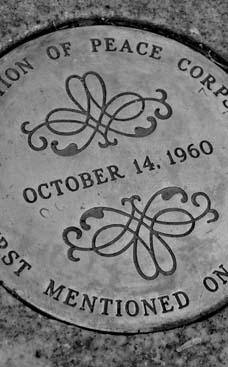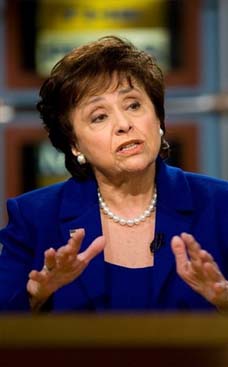
Whitehouse disagrees with using exclusively the "hydraulic model" of migration, which says that migrants take the easiest path possible, based mostly on material factors such as employment and living conditions. Instead, he sees migrants as agents who actively choose when and where to go by considering "cultural and ideational" factors along with material ones. This is what he saw being enacted when West Africans chose to migrate to Brazzaville. The Malians that Whitehouse studied remained extremely connected to their communities in Mali, and some sent their children to be raised in their own villages of origin. For example, he met one Malian woman who had been born in Brazzaville. Her parents sent her to live with her extended family in Mali when she was three, and she lived there until age 22, when she returned to Brazzaville with her husband, migrating to begin a business. There, she met her parents for the first time since she was a toddler, and she soon sent her young ones back to Mali to be raised, continuing the cycle.
Mali RPCV Bruce Whitehouse spoke recently about the particular trail of intra-African migration between two cities: Bamako, in Mali, and Brazzaville, in the Republic of the Congo
Bruce Whitehouse
Exile Knows No Dignity: African Transnational Migration and the Anchoring of Identity
Africa Group Colloquium Series
Thursday, February 8, 2007
through
Related Person
Philip Leis
"Exile Knows No Dignity: African Transnational Migration and the Anchoring of Identity," with Bruce Whitehouse.
Bruce Whitehouse is a doctoral candidate in anthropology at Brown University, and his research examines questions of identity and place in the contemporary world. From 2005 to 2006 he carried out fieldwork in Bamako (Mali) and Brazzaville (Congo) studying transnational migration from West Africa to Congo. He also served as a Peace Corps Volunteer in Mali from 1997 to 2000.
Presented by the Africa Group Colloquium Series.
Location: McKinney Conference Room.
Event Summary
Doctoral candidate of anthropology Bruce Whitehouse spoke recently about the particular trail of intra-African migration between two cities: Bamako, in Mali, and Brazzaville, in the Republic of the Congo. In his year of fieldwork in these cities, Whitehouse found what he called "the stranger's code," in which "foreigners" are expected to stay out of their local residence's affairs, even if they were born there or have lived there for many years.
Brazzaville has long been a destination of economic migration for Malians, said Whitehouse, even though it is 2,000 miles from Bamako a plane ticket that is unaffordable for many.
The migrants remain "strangers" in Congo, still connected to Mali despite the distance: even children of Malian migrants, born in Brazzaville, consider themselves "100 % Malian." This is the result of a phenomenon that Whitehouse terms "the stranger code." This is produced by both the external rejection by Congolese society of foreigners through prejudice and harassment and by the internal rejection of Congolese society by Malians by following cultural practices from Mali such as distinctive clothing, for example. Although "the stranger's code" is evident in Brazzaville, said Whitehouse, it is not unique to that region of Africa, Whitehouse said in a lecture titled "Exile Knows No Dignity: African Transnational Migration and the Anchoring of Identity."
Whitehouse disagrees with using exclusively the "hydraulic model" of migration, which says that migrants take the easiest path possible, based mostly on material factors such as employment and living conditions. Instead, he sees migrants as agents who actively choose when and where to go by considering "cultural and ideational" factors along with material ones. This is what he saw being enacted when West Africans chose to migrate to Brazzaville.
West Africans, not just Malians, have been coming to Congo since French colonial times, and they have a tradition of a strong commercial community in Brazzaville, said Whitehouse. Most go to make their fortune, but they also go to follow tradition.
The Malians that Whitehouse studied remained extremely connected to their communities in Mali, and some sent their children to be raised in their own villages of origin. For example, he met one Malian woman who had been born in Brazzaville. Her parents sent her to live with her extended family in Mali when she was three, and she lived there until age 22, when she returned to Brazzaville with her husband, migrating to begin a business. There, she met her parents for the first time since she was a toddler, and she soon sent her young ones back to Mali to be raised, continuing the cycle.
Whitehouse noted three main points on the spectrum of migration, depending on economic status of the West African migrants living in Brazzaville. The very wealthy often sent their children back to Mali because they could afford the plane tickets to visit. The very poor raised their children in Brazzaville, still feeling connected to Mali, although sometimes seen as "culturally impure." In the middle, migrants made enough money to send children home to their villages, but they could not visit, and so the children were raised with absent parents.
Whitehouse concluded with the reminder that globalization is only increasing the importance of transnational connections and identities. "Dual citizenship, in a social and cultural sense, is highly problematic," he said, but it must be addressed.
The lecture was part of the Africa Group Colloquium Series.
Submitted by Watson Institute Student Rapporteur Liana Paris 07













